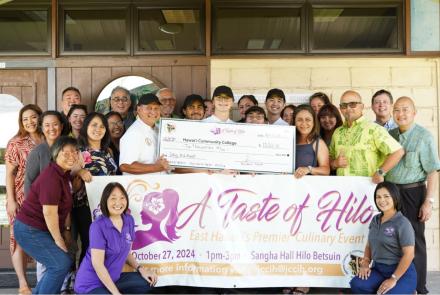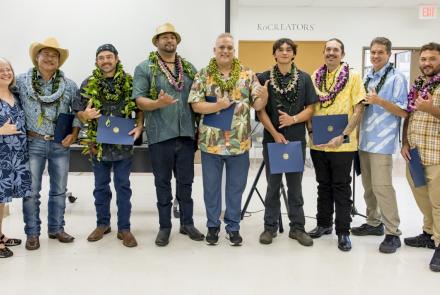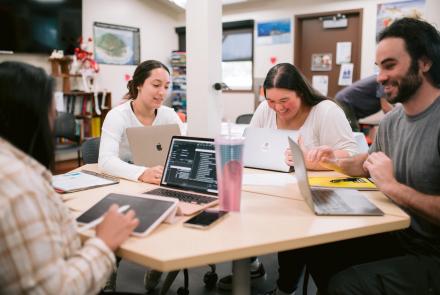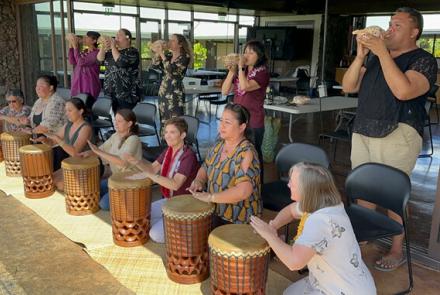I Ola E Nā Kini Ē / Sustainability and Geography
By Drew Kapp and Noʻel K. Tagab-Cruz
In honor of Hawaiʻi Community Collegeʻs vision for E ʻImi Pono (to seek excellence), the month of April 2024 was dedicated to the celebration and preservation of our Earth. In collaboration with UH Hilo, Hawaiʻi CC hosted various events that included indigenous perspectives on ʻāina (land), wai (water), and establishing a personal connection to our natural environment, not only through Lā Honua Earth Days 2024 celebration, but also through activities connected to a Geography conference. The inter/national American Association of Geographers (AAG) annual conference - one of the worldʻs largest - took place in Hawaiʻi for the first time in more than two decades, in April, as well.
On April 14, a contingent of professional Geographers from the AAG traveled to Hawaiʻi Island to participate in a huakaʻi (excursion). The organizing team for the huakaʻi included Assistant Professor Drew Kapp from Hawaiʻi CC and Professor Kathryn Besio from UH Hilo. This was a collaborative event with the Edith Kanakaʻole Foundation who hosted the group at Hale o Lono fishpond in the morning under the stewardship of Luka Kanakaʻole. The afternoon was spent at the Luapele of Kīlauea with guest speaker Noʻel K. Tagab-Cruz, an Assistant Professor in Hawaiian Studies and Coordinator of the I Ola Hāloa Center for Hawaiʻi Life Styles program at Hawaiʻi CC. Hawaiʻi CC students Erena Meleana Faumuina and Wynn-Tessa Gold also joined the huakaʻi, offering student perspectives to the visiting geographers on the importance of ʻāina-based education. Huakaʻi participants learned about profound connections to place, about mauka-makai relationships, and participated in a mālama ʻāina project and basic Hawaiʻi protocols, and were visibly positively transformed. A geographer from London expressed gratitude for “being introduced to places and communities through which Kanaka ʻŌiwi resurgence is so dynamically present.”
On April 17, six students from Hawaiʻi CC, Kapiʻolani CC and UH Hilo served on a panel at the AAG Conference to share about sustainability efforts at Hawaiʻi CC via the Geography 122 course Drew teaches. Funding for student travel was provided by Hawaiʻi CC Student Government with the assistance of Larissa Leslie, Chair of the Counseling Department. The student panel, supported by the Indigenous Peoples Specialty Group of the AAG, was titled “Students Engaging in Sustainability at Hawaiʻi Community College,” and served as an opportunity for our students to voice their personal connection and relevance of Sustainability and Aloha ʻĀina and their own personal development. The student panel abstract reads:
Kanaka Maoli (Native Hawaiian) ideologies inherently included sustainably interacting with their island ecosystems. The current settler colonial ideologies too often prioritize economic gains at the expense of environmental sustainability. In an effort to refocus on Kanaka Maoli ideologies, Hawaiʻi Community College offers an Academic Subject Certificate (ASC) in Sustainability, providing students with an interdisciplinary understanding of core environmental and sociocultural sustainability studies concepts drawing from Hawaiian Studies, Natural Science, Social Science, and other disciplines.This certificate addresses cultural vibrancy, economic prosperity, environmental responsibility, and social justice. It is the equivalent of a minor in sustainability meeting general education requirements and provides the foundation for UH system certificates and four-year degree programs.
Sustainability-designated courses enhance traditional course content by centering on sustainability issues, service projects, or other assignments through which the course content is delivered and understood. They describe how traditional and Kanaka Maoli perspectives or other socio-cultural values and attitudes inform sustainability practices and encourage students to connect to personal values and attitudes that facilitate sustainable living.This panel showcases Hawaiʻi Community College students who have participated in stewardship activities at loko iʻa (fishponds), in loʻi kalo (taro patches), with native forest restoration, marine debris clean-up, sustainable food gardens, and Indigenous food sovereignty.
The students who served on the panel represented various UH campuses, but what they have in common is they were all enrolled in Geography 122 with Drew at Hawaiʻi CC, learning together in virtual classrooms and wahi pana of Hawaiʻi Island:
Erena Meleana Faumuina, Hawaiʻi CC J. Kauʻinohea Walsh, Hawaiʻi CC
Juss Kawaianiani Ferry, UH Hilo Kahekili Yung, Kapiʻolani CC
Rocco Arnott, Hawaiʻi CC
Wynn-Tessa Gold, Hawaiʻi CC
The student panelists spoke of elements and aspects of their academic, personal and cultural journeys, each articulating a profound connection to ʻāina - that vital source of inspiration, identity, belonging and well-being. The students impressed both attendees and our faculty members who accompanied them. Among those was Hawaiʻi CC Geography Lecturer Renee Pualani Louis, who shared:
“It was an honor to meet with and watch this group of community college scholars seamlessly work together to deliver what one conference attendee said was the most inspiring session at the AAG. Indeed, never before in the over 2 decades of AAG conferences I have attended have I seen a presentation that combined oli, ʻōlelo noʻeau, moʻolelo, and hei to demonstrate their manaʻo (informed understandings) about kanaka maoli infused sustainability practices. They have proven these perspectives and practices are not only innovative but also effective and valuable for academic integration.”
Other Hawaiʻi CC instructional faculty present at the student panel were Drew and Noʻel. Together with Pualani, we served as mentors to the students as they designed and led their student panel session.
Our students shared testimonials to the conference experience, excerpted here:
Kauʻinohea Walsh, a Hawaiʻi CC student working on his Sustainability Academic Subject Certificate affirmed:
"We all shared from our naʻau and in return we received so much support and encouragement which has really inspired me to keep learning. As kanaka, there is this inherent desire to share our culture with others because we know what we are doing is pono and can help make a difference."
Rocco Arnott, affiliated with Pālamanui, who aspires to be a teacher, expressed:
“Participating in the student panel at the AAG conference expanded my understanding of what it means to mālama ‘āina. I will carry this knowledge with me for the rest of my life and look forward to passing it on through my own teachings in the future.”
Kahekili Yung, a Kapiʻolani CC student from Hawaiʻi Island enrolled in the Hawaiʻi CC class, and who considers teaching at a Hawaiian language immersion school, shared:
“As a panelist, I'm grateful for the opportunity to share the ideas we hold dearly. The conference was a great chance to strengthen my communication skills in academic networking settings. Additionally, I enjoy talking about the importance of having a connection with land.”
Two Hawaiʻi CC students, Erena Meleana Faumuina and Wynn-Tessa Gold, who both returned to college after raising their children and who involve their daughters in their educational experiences at Hawaiʻi CC, exposing them to mālama ʻāina projects, shared with great passion their stories:
Meleana urged us to:
“...work together to teach and bring back nurturing and caring for the old ways of feeding and nourishing the minds and bodies of families, schools and communities, and to be pono with self navigating our future and our keiki's futures.”
Tessa testified:
“This experience was nothing short of amazing. Life-changing on so many levels. It helped me realize that I have the capabilities of positively influencing people who are willing to listen. This will be the experience that I can confidently say, changed the trajectory of my life, for the better.”
Juss Kawaianiani Ferry, who has recently transferred to UH Hilo to major in History, while continuing to take Hawaiʻi CC classes, described this interaction:
“Of all my friends on the panel, to my right sat a very driven, mature, and admirable young man whose name is Rocco. He and I had a sublime moment that I reveled in during our post-informal Q&A mingle. A young, timid, but still inquisitive woman approached Rocco and in her nervous accent ʻWhy’d you say your mountain and your water?ʻ [as part of his introduction]. Rocco explained it was due to his love for them. The young woman radiantly replied with a smile stating her Mauna’s name in Taiwanese and, well, that’s a simplistic piece of beauty that Mālama ʻĀina can bring.”
In closing, we want to continue to celebrate our learners and the community of faculty and staff who support the academic journey of our learners especially with the emphasis on sustainability. For the faculty, it is a welcomed reminder that it is our duty and honor to mentor and foster emerging leaders rooted in place-based practices and indigenous excellence. In the spirit of E ʻImi Pono, let us all strive to do things that keep us connected to the natural environment because every day is Earth day.





